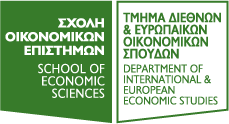Fall Semester 2023-2024
-
Date:20/12/2023 - 15:30 to 17:00

Wednesday, December 20, 2023
Title: "Self-Enforcing Climate Coalitions for Farsighted Countries: Integrated Analysis of Heterogeneous Countries"
Speaker: Assistant Professor Maria Arvaniti, University of Bologna
Host: Assistant Professor Efthymios Athanasiou, Department of Economics, Athens University of Economics and Business
Time: 15.30 -17.00
Room: A36
Attachments:
 PDF of Relevant Paper
PDF of Relevant PaperAbstact: We study formation of international climate coalitions. Countries are farsighted and rationally predict the consequences of their membership decisions in climate negotiations. Within the context of an integrated assessment model of the economy and the climate, we characterise the equilibrium number of coalitions and their number of signatories independent of certain types of heterogeneity, and show that the resulting treaties are robust to renegotiation. With a richer structure of energies we investigate possible coalition outcomes for a calibrated model. We confirm our heterogeneity results and in contrast to earlier approaches based on internal and external stability, much larger coalitions can be sustained in equilibrium.
-
Date:26/01/2024 - 13:00 to 15:00
 POSTPONED
POSTPONEDTitle: "What is productive investment? Insights from firm-level data for the United Kingdom"
Speaker: Dr. Philip Schnattinger, Bank of England
Host: Assistant Professor Alexopoulos Angelos, Department of Economics, Athens University of Economics and Business
Time: 13.00 -15.00
Room: A36
Attachments:
 PDF of Relevant Paper
PDF of Relevant PaperAbstact: This paper studies the effects of different types of investment and levels of debt on productivity in the UK. We examine the issue empirically using data on listed firms in the UK. Our main finding is that intangible investments are a good proxy for productivity-enhancing investment, as they have a positive effect on Total Factor Productivity (TFP). On the other hand, we find no consistent evidence of positive TFP effects for tangible investment. In those firms that have high debt and high levels of intangibles, the positive TFP effects are even more pronounced. Hence, debt can be "good" if it is associated with productivity-enhancing investments. We then set out a stylised model of a dynamic firm profit maximisation problem, and augment this model with an external financing option in a novel way. Uniquely, we use neural network methods to solve the value function of the model and propose a moments-matching approach that allows us to estimate some of the parameters of the model. We use the model to illustrate how productivity enhancing investment differs from other investments in its effects on TFP, and how these positive effects can be stronger for firms that have higher indebtedness. Applying our model to aggregate TFP dynamics in the UK suggests that around 0.07 pp, or a fifth of the TFP slowdown in the UK since the Global Financial Crisis can be attributed to weaker intangibles investments in large UK firms.





